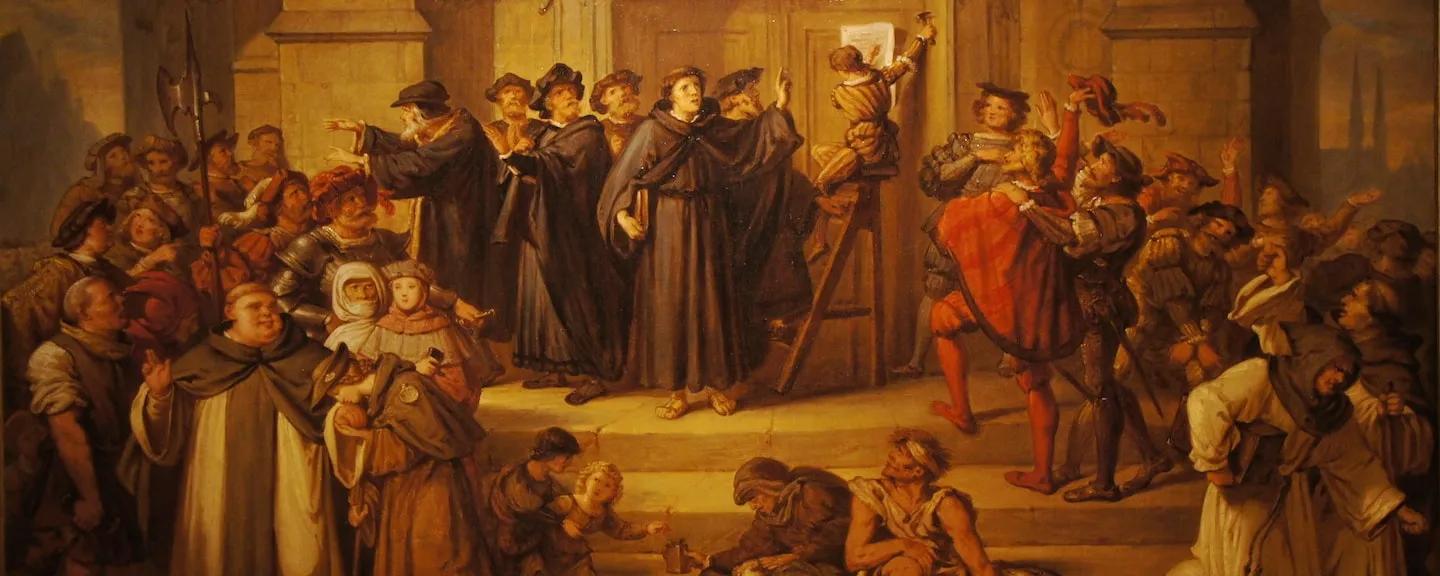- Home
- >
- APU Articles
- >
- News Article
500 Anniversary of the Protestant Reformation
October 30, 2017 | Written By Don Thorsen

Before that day, the Catholic Church, centered in Rome, had tried for centuries to institute needed reforms. However, erratic leadership, along with social, economic, and political challenges, had prevented many of the reforms from succeeding. When Luther posted his 95 thesis statements (a common practice at the time), he proposed reforms that would benefit the Catholic Church and invited public dialogue about the suggested changes. His ideas quickly spread throughout Europe, aided by the newly invented printing press. The influence and imprint of the Reformation not only shaped the trajectory of the Protestant Church, but also nearly every aspect of society—science, literature, art, politics. Five centuries later, the significance of Luther’s claims still resonate with individuals, churches, and denominations.
Protestant Emphases
Luther argued that Scripture alone (Lat., sola Scriptura), rather than Church leadership, represented the primary religious authority by which Christians should determine their beliefs, values, and practices. Luther criticized the Catholic view of sacraments and the sale of indulgences. Luther believed that sacraments were valuable because of the faith of those who partake of them, not because of the priests’ mediation. In addition, Luther emphasized salvation by grace alone (Lat., sola gratia) through faith alone (Lat., sola fide).
Regarding indulgences, Catholics believed in a treasury of merit stored up by Jesus Christ and the saints that aided in the moral purification of believers in purgatory after they die. Catholics sold indulgences, which enabled the treasury of merit to aid those in purgatory. However, Luther argued that the commercialization of indulgences led to abuses, such as people believing that they could buy their way into heaven.
In response, Pope Leo X excommunicated Luther. When Luther’s regional sovereign, Frederick III, Elector of Saxony, rescued him from execution, Luther began writing prolifically: theological treatises that helped establish the Protestant Reformation, and a German translation of the Bible so that all people would be able to read it for themselves. Thus, Luther empowered Christians to discover biblical truths for themselves and to respond as they believed God led them, both for salvation and for ministry.
Multiple Reformations
Luther’s work sparked a succession of Christian reformations around Europe. In Great Britain, the Church of England (also known as the Anglican Church) began. Anglicans became a middle way (Lat., via media) between Lutheranism, which they considered too radical in its focus upon Scripture alone, and the Catholic Church, which held traditions that Anglicans wanted to preserve. Thus, Anglicans preserved many of the rites, rituals, and hymnody of Catholicism, which Lutherans rejected.
The Reformed tradition of Protestantism arose concurrently with Luther and Lutheranism, led initially by Ulrich Zwingli in Switzerland. Later, John Calvin became the primary leader of the Reformed tradition, writing a systematic theology that tremendously shaped the development of Protestant theology.
The Catholic Church also reformed in response to the upheavals of the Protestant Reformation. At the Council of Trent, many beneficial changes occurred within Catholicism at the end of the 16th century. Despite these reforms in the Catholic Church, however, they were not sufficient for reconciliation with Protestants, because Catholics still emphasized the primacy of apostolic and papal authority.
Reformed and Always Reforming
The Protestant phrase “reformed and always reforming” communicates the idea that the Holy Spirit continues to work in the lives of believers and churches, reflective of contemporary needs and concerns. This phrase was certainly true of developments among Protestants subsequent to the Reformation—two of which can be seen in the theological traditions of Azusa Pacific University.
In 17th century England, the Society of Friends (also known as Quakers) tried to reform the Church of England, emphasizing the inner light of the Holy Spirit, the priesthood (or ministry) of all believers, plain dress, and opposition to slavery. These evangelically oriented Friends helped found Azusa Pacific University.
In the 18th century, John and Charles Wesley founded the Methodist movement, which also intended to reform the Church of England. The Wesleys emphasized evangelization, holy living, and the importance of attending small accountability groups. The Wesleyan tradition also influenced the founding and continuation of the university’s beliefs, values, and practices.
That They All May Be One
In John 17:21, Jesus prays for his disciples, “that they all may be one” (NKJV). Since the Protestant Reformation, it has become increasingly difficult for Christians to achieve unity. In a sense, Luther opened a floodgate of church divisions that has not waned. Although Protestants rightly emphasize the primacy of biblical authority, they need to be careful with the liberty they have in deciding for themselves about their beliefs, values, and practices. In addition, Christians ought not to give up hope for finding ways of cooperating with one another.
During the past century, churches have become more interested in ecumenism, which intends to find ways of cooperating with one another, at least in terms of shared ministries. Some have worked together for the sake of social advocacy, and others have partnered for the sake of evangelization and missions. In this way, Azusa Pacific University represents an ecumenical institution of higher education, dedicated to the training of Christian disciples and scholars.
In commemorating the 500th anniversary of the Protestant Reformation, it is good to remember the leadership of Luther in seeking to reform churches to better reflect God’s teachings in the Bible. It is also good to remember Jesus’ prayer for unity and to seek ways in which Christians may embody the hope of being reformed and always reforming.